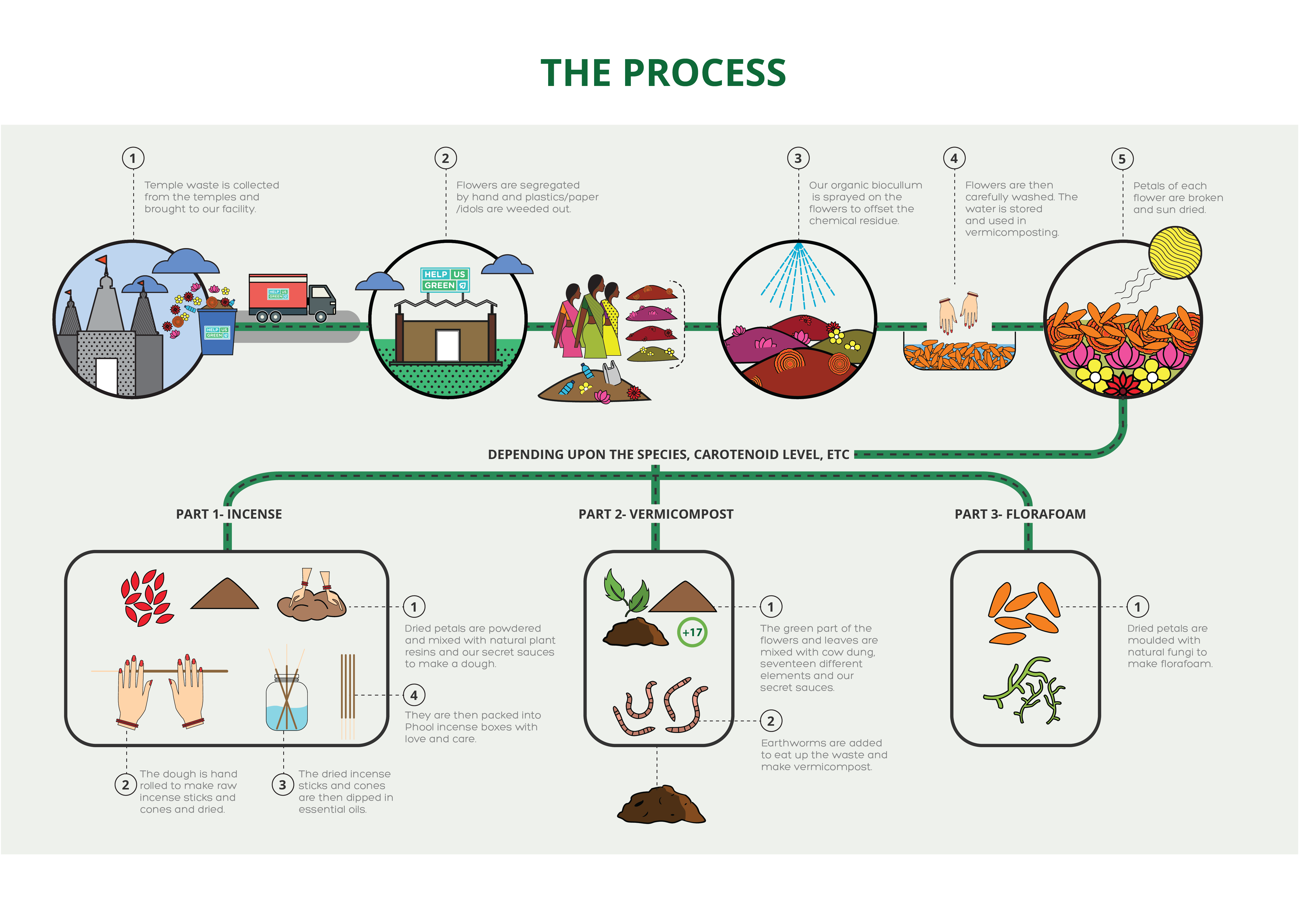
- Inspiring People -
- 4mins -
- 598 views
INDIAN ENTREPRENEURS UPCYCLE LEFTOVER RELIGIOUS FLOWERS INTO USEFUL PRODUCTS
Social enterprise Helpusgreen aims at preserving the River Ganges by “flowercycling” waste from places of worship in India and Bangladesh into useful things while creating dignified livelihoods.
Indian Entrepreneurs Upcycle Leftover Religious Flowers Into Useful Products
Social enterprise Helpusgreen is helping to preserve the Ganges River by collecting the floral waste from temples and mosques that is dumped in the river and flowercycling (upcycling) it into patented fertiliser and incense sticks. This, in turn, provides dignified and secure livelihoods to manual scavenger families in Uttar Pradesh, India.
Turning flower waste into soap, incense, fertiliser and more…
When Ankit Agarwal told his parents he had quit his job at cyber security firm Symantec to clean up temples, they were horrified.
He told them of his idea to process waste flowers from temples to produce soaps, incense sticks, organic fertilisers and even a kind of styrofoam.
Born and raised in Kanpur, Uttar Pradesh, Agarwal had seen the river Ganga turn into a filthy heap of temple waste—mostly rotting flowers.
He felt a solution to process the refuse held business opportunities, besides helping to save the river and generate
Together with friend Karan Rastogi, Agarwal launched HelpUsGreen with an initial investment of Rs 72,000 (€900/£790/$1020) in May 2015 in Kanpur.
Today, HelpUsGreen has the backing of seed funding from Tata Trusts’ Social Alpha, Greenfield Ventures and Echoing Green.
Source: helpusgreen.com

HelpUsGreen provides employment, social acceptance and dignity to the most disadvantaged
Waste pickers are a key part of the operation. Helpusgreen pays these informal “scavengers” to sort the flowers in their different types while taking out unwanted cup holders and garland strings.
Agarwal says the pickers, mostly women of lower castes, normally earn about 10 rupees a day (about 15 cents) but now get at least 150 rupees (more than $2).
HelpUsGreen employs around 80 women at its Kanpur facility and provides them with benefits such as provident funds, health insurance and transport to and from work.
Agarwal and Rastogi are planning to launch two more plants in Varanasi and Mathura by June. Combined with the Kanpur plant, the new facilities will take their company’s processing capacity to 38 tonnes of flowers a day.
This will provide livelihoods to even more manual scavenger families in Uttar Pradesh, India.
Since the Ganges is considered sacred in India, cleaning the river not only provides employment to manual scavengers, but eliminates the entrenched attitudes and discriminatory practices that still bind families to this degrading occupation.
The community benefits from a reduction in disease, predictable income, social acceptance and, most importantly, dignity.
Today, HelpUsGreen has the backing of seed funding from Tata Trusts’ Social Alpha, Greenfield Ventures and Echoing Green.
The project is scalable and brings a hope to revive the Ganges.
Source: HelpUsGreen.com
 The process of turning toxic flower waste into a positive resource Toxic Arsenic, Lead and Cadmium from the harmful farm-runoff, pesticides, insecticides (>1000ppm) used to grow flowers mixes with the river water making it highly poisonous (PH 6-8.5) -linked to contracting cholera, hepatitis and severe diarrhea – the leading causes (86.7%) of child mortality across India & Bangladesh. Source: HelpUsGreen.com
The process of turning toxic flower waste into a positive resource Toxic Arsenic, Lead and Cadmium from the harmful farm-runoff, pesticides, insecticides (>1000ppm) used to grow flowers mixes with the river water making it highly poisonous (PH 6-8.5) -linked to contracting cholera, hepatitis and severe diarrhea – the leading causes (86.7%) of child mortality across India & Bangladesh. Source: HelpUsGreen.comWhat is Flower Pollution?
Showering flowers (8 Million tonnes annually) at Temples/Mosques is a religious ritual in India. These flowers are a symbol of devotion and thus believed that these sacrosanct flowers should be discarded into water bodies like the River Ganges to respect their sanctity.
Sadly, these sacred flowers rot and create havoc in the fragile ecosphere of the waterbody and leach into the groundwater.
The monumental temple-flower disposal and the deep-rooted religious significance is overriding Ganges’ biophysical stability, killing it.
The Ganges, which is virtually synonymous with the Indian civilisation, is dying.
More than 420 million people rely on the Ganges for food, water, bathing and agriculture and not to mention the tens of Millions of pilgrims who venture to India’s most holy of rivers each year to bathe and worship. Pollution, over-extraction of water and emaciated farm canals are killing the mighty river.
Helpusgreen® is eliminating a stream of pollution- the monumental flower-waste, the project is self-sustaining and bring hope to the Ganges. Follow them on Twitter.
Source: HelpUsGreen.com

